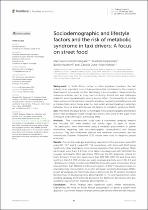| dc.contributor.author | Sekgala, Machoene Derrick | |
| dc.contributor.author | Opperman, Maretha | |
| dc.contributor.author | Mpahleni, Buhle | |
| dc.date.accessioned | 2023-06-27T07:24:00Z | |
| dc.date.available | 2023-06-27T07:24:00Z | |
| dc.date.issued | 2023 | |
| dc.identifier.citation | Sekgala, M. D. et al. (2023). Sociodemographic and lifestyle factors and the risk of metabolic syndrome in taxi drivers: A focus on street food. Frontiers in Nutrition, 10, 1112975. 10.3389/fnut.2023.1112975 | en_US |
| dc.identifier.issn | 2296-861X | |
| dc.identifier.uri | https://doi.org/10.3389/fnut.2023.1112975 | |
| dc.identifier.uri | http://hdl.handle.net/10566/9158 | |
| dc.description.abstract | In South Africa, similar to other populous countries, the taxi
industry is an important form of transportation that contributes to the country’s
development. As a result, minibus taxi driving is an occupation characterized by
strenuous activities such as long hours of driving, limited rest, and challenges
related to securing passengers, among several others. Consequently, to combat
stress, some commercial drivers resort to smoking, overeating unhealthy food sold
at transportation interchange areas (i.e., taxi ranks), and participating in sedentary
behaviors. Most of these activities are risk factors for metabolic syndrome (MetS). | en_US |
| dc.language.iso | en | en_US |
| dc.publisher | Frontiers Media | en_US |
| dc.subject | Public health | en_US |
| dc.subject | Nutrition | en_US |
| dc.subject | Metabolic syndrome | en_US |
| dc.subject | South Africa | en_US |
| dc.subject | Socio-economic status | en_US |
| dc.title | Sociodemographic and lifestyle factors and the risk of metabolic syndrome in taxi drivers: A focus on street food | en_US |
| dc.type | Article | en_US |

